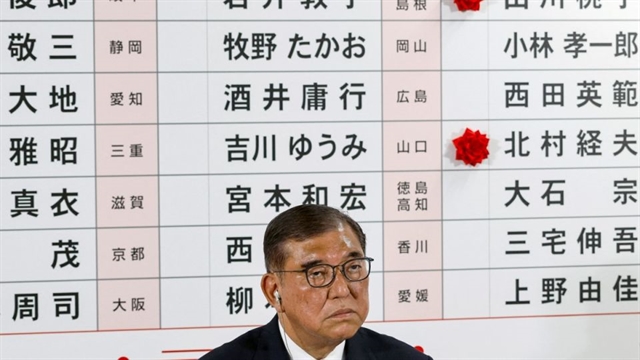 World
World


|
| Japan's Prime Minister Shigeru Ishiba addresses the media at the vote counting centre in the LDP headquarters in Tokyo on Sunday. — AFP/VNA Photo |
TOKYO — The ruling coalition of the Liberal Democratic Party and Komeito failed to win 50 seats in the House of Councillors election on Sunday. The ruling bloc loses their majority in the Upper House.
The ruling coalition struggled in both constituency and proportional representation races. The results appear to be a harsh public indictment of Prime Minister Shigeru Ishiba’s leadership on measures to combat rising prices and responding to US tariff measures, suggesting an increasingly challenging path for the future administration of the government.
Among opposition parties, the Democratic Party for the People and Sanseito were projected to make major gains.
Ishiba, who is also the president of the LDP, expressed his intention to remain in office even if the ruling coalition fails to secure a majority in the upper house.
Ishiba said: “Ballots are still being counted, so I cannot make careless statements. However, so far, we have the most seats, making us the largest party. For that, we are grateful.
“Furthermore, throughout the campaign, we touted our policies to the nation on various critical issues — wage increases that surpass rising prices, achieving a GDP of ¥1 quadrillion and responding to the challenging security environment. There are also responsibilities we must fulfill for the nation regarding disaster preparedness, regional revitalization and measures against the declining population.
“I believe we must be keenly aware of our responsibility as the largest party and what we have to do for the country.”
Ishiba had set winning at least 50 seats by the LDP-Komeito coalition as a “must-achieve target.” Komeito, which had 14 seats up for election, also appeared poised to lose seats.
“I feel very responsible [about the outcome of the election],” LDP Secretary General Hiroshi Moriyama said on a TV programme. “However, regarding how I can take responsibility, I wish to thoroughly discuss it with the party president.”
“It is crucial to thoroughly analyze the public opinion expressed in this election,” Itsunori Onodera, chairperson of the LDP’s Policy Research Council, said on a TV program, referring to future government management following the harsh election results.
Onodera also touched on the responsibility of the party’s leadership, saying, “If the election outcome was a result of our policies not being accepted by the public, I take that seriously as the person responsible for policy.”
“Right now, we’re confident that we’ll get a significant number of seats,” Sanseito leader Sohei Kamiya said at a press conference on Sunday night.
Saya of Sanseito looked certain to secure victory in the fiercely contested Tokyo constituency, in which seven seats were up for grabs, including one seat to fill a vacancy. It would be her first election to the upper house.
“I believe that our consistent commitment to a ‘Japanese First’ policy, along with our advocacy for the phased abolition of the consumption tax to address the rising prices and stagnant wages afflicting many, resonated with a large number of people,” Saya, who is also known as a singer, said on a TV programme Sunday night.
DPFP leader Yuichiro Tamaki ruled out the possibility of partnering with the Ishiba administration.
“A coalition with the Ishiba administration is out of the question,” Tamaki said on a TV programme on Sunday night. “We will work with both ruling and opposition parties whenever possible to achieve our policy goals.”
Meanwhile, Constitutional Democratic Party of Japan leader Yoshihiko Noda had set a “minimum target” of the ruling bloc failing to secure a majority among the contested seats, and expressed a desire for the ruling parties to lose their overall majority in the upper house. — The Japan News/ANN




